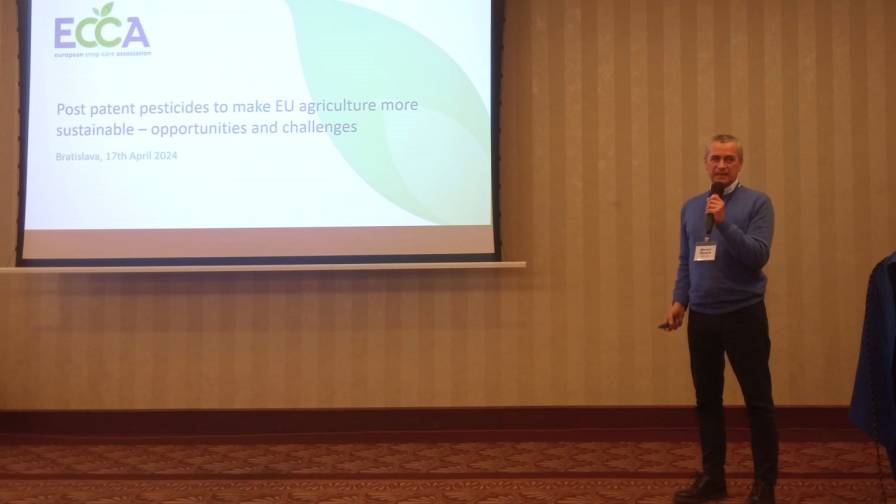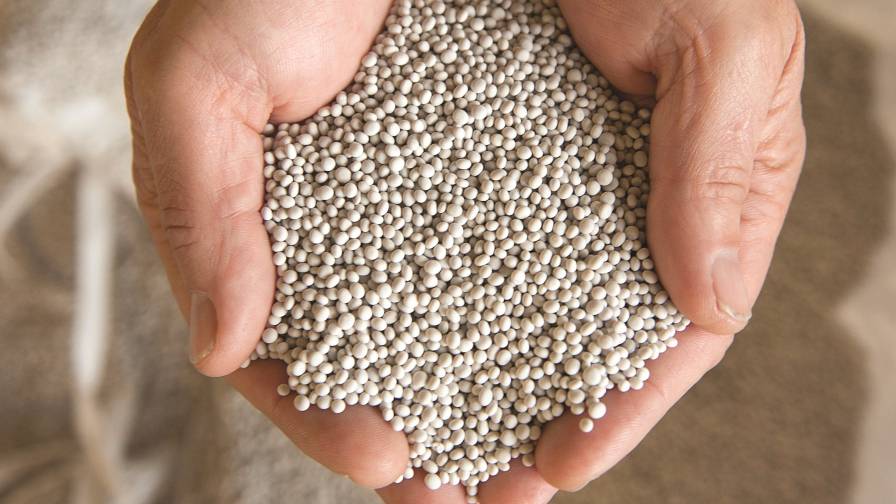Bayer Sees Brazil ‘Returning to Normal in 2018’; Reveals R&D Plans
Bayer said the global seed and crop protection market remains volatile in 2017, but high population growth, growing demand for feed and fuel and other factors support a long-term increase in demand that will drive business.
“Despite the current market volatility, our Crop Science business is well positioned to fulfill future customer, market and societal needs,” said Liam Condon, Bayer Management Board member and President of the Crop Science Division, on Tuesday during his presentation at the company’s Future of Farming Dialog 2017 on September 18-20.
The event brings together thought leaders and stakeholders from across the agricultural industry to highlight the need for various groups – including industry, government, academic and NGO representatives and from both the public and private sectors – to cooperate to make the world’s food system more sustainable and thus fit for the future.
Condon noted that high population growth, changing consumption patterns and increasing consumer demand for sustainably produced food will have a positive impact on food production, global agricultural trade and ultimately on farm income. “Those factors combined with the steadily growing global demand for feed and biofuel feedstocks support a long-term increase in demand that will drive our business,” Condon pointed out.
Business in Brazil expected to return to normal in 2018
Short-term volatility is always possible in a business dependent on the weather as well as pest and disease prevalence, especially in tropical climates such as Brazil. “Over the past two years, lower pest pressure and drought in key parts of the country have led to lower demand for insecticides and fungicides,” Condon explained. “We experienced a significant decline in sales and earnings in connection with historically high channel inventories at the end of this year’s harvest season in Brazil.” The elevated inventory situation affects the entire market but Bayer is likely to be more heavily affected due to its strong market position in both segments, insecticides and fungicides. Measures have been initiated in order to return to a more normal situation, for example re-allocation of products to different markets and lower sell-in.
“For 2018 overall we forecast a return to growth in Brazil,” Condon said during his keynote address at the conference. As previously indicated with the publication of the Q2 results, due to provisions for Brazil, Bayer is now anticipating sales of less than EUR 10 billion (previously: sales of more than EUR 10 billion) for its Crop Science Division in 2017. This corresponds to a low single-digit percentage decline on a currency- and portfolio-adjusted basis.
Innovation is crucial for sustainable agriculture
Focusing in his speech on sustainable agriculture, Condon also reaffirmed the commitment of the Crop Science Division to investing in innovation and developing customized agronomic solutions for farmers that address their individual needs and challenges.
In this context, Condon emphasized that the proposed acquisition of Monsanto presents a tremendous opportunity to positively shape the future of farming. “It is our responsibility to ensure that innovation is made available to farmers large and small, all over the world. Only then can we make a meaningful contribution to ensuring a sustainable world food system.”
Bayer is also committed to helping meet the UN Sustainable Development Goals that are related to combating hunger and poverty and promoting good health and well-being, sustainable cities and communities, responsible consumption and production patterns as well as climate action and partnering.
Progress being made in planned acquisition of Monsanto / Closing anticipated in early 2018
Regarding the process and time frame of the acquisition, Condon said that the company is making progress. In late June 2017, Bayer filed a submission to obtain antitrust approval from the European Commission. On August 22, the European Commission initiated a Phase II investigation.
In consultation with the European Commission, Bayer filed an application on Monday, September 18, to extend the review deadline by 10 working days until January 22, 2018, with the aim of facilitating an appropriate evaluation given the size of the transaction. “In view of this, an anticipated closing of the deal in early 2018 is now more likely than end of 2017,” Condon said. Bayer has submitted applications for clearance to almost all of the around 30 relevant authorities, and has already received approvals from over one-third of them.
Digital Farming products successfully rolled out in more than 30 countries
Condon also addressed the company’s efforts in the field of digital technologies. “We are committed to investing at least EUR 200 million in our Digital Farming business between 2015 and 2020.” Already today, most new farm machinery is equipped with precision agriculture features. New tools help farmers optimize inputs such as fertilizer and crop protection agents with corresponding improvements in yields and quality. “Innovative digital farming technologies help farmers big and small grow healthier crops more efficiently and more sustainably,” Condon said.
Digital Farming solutions also help meet society’s rising requirements in terms of transparency and sustainability. “We are therefore collaborating closely with highly competent partners such as Bosch and FaunaPhotonics, universities, start-up companies and nonprofit organizations like Quantified Planet. By donating and sharing proprietary data, we are contributing to research into biodiversity for the benefit of both agriculture and civil society.”
Currently, Bayer provides digital solutions in more than 30 countries and is aiming to achieve rapid further expansion. The new technologies have huge potential not only in countries such as Canada, the United States, Brazil, Germany, France, Ukraine and Russia, but also for smallholder farmers in developing countries. Enabling smallholder farmers to reach their farming potential is key to increase agricultural productivity in a sustainable manner and to improve the lives of their families and communities.
R&D investment of approximately EUR 1 billion
During his keynote address, Condon was joined by Adrian Percy, global head of Research and Development for the Crop Science Division, who shared more information about Bayer’s R&D pipeline and investments. “At Crop Science, we’ve been investing approximately EUR 1 billion annually in research and development to bring new products to the market to address the major challenges affecting farmers worldwide,” Percy pointed out. “We’ve made it our responsibility to listen to our customers to understand the specific issues they face from country to country and region to region, better enabling us to deliver the customized agronomic solution that fits their individual needs best.”
Crop Science R&D pipeline to bring 15 new products to farmers by 2020
“We are very proud of our innovative solutions such as our Luna and Aviator Xpro fungicides as well as our Sivanto insecticide, which are all demonstrations of our capability to innovate. Not to mention our LibertyLink soybean seeds and InVigor canola hybrid varieties with our patented pod shatter reduction technology,” Percy said. “These products have become significant contributors to revenue within just a few years.” Bayer has a variety of biological crop protection solutions in its development pipeline, for example Poncho™/VOTiVO™ 2.0. A second, complementary bacterium increases the productivity of soil around the root, resulting in an increase of available nutrients for the plant to use.
Percy also outlined the current Crop Science R&D pipeline with 15 active ingredients and traits / trait combinations to be launched from 2017 to 2020. The integrated pipeline also contains more than 100 life-cycle management projects as well as several hundred new seed varieties in vegetable and broad acre crops. The activities of the global R&D organization will be guided by R&D targets to address the major unmet needs of growers worldwide with future innovative solutions in chemical and biological crop protection as well as seeds and traits.
While Bayer has a world-class R&D team working internally on innovation, the company has also established a successful external innovation platform to capitalize on the expertise and strength of many institutions, organizations from academia and the industry, and start-up companies with common purposes and goals. “Through strategic research partnerships, crowd-sourcing tools and venture capital funding, we are collaborating on multiple fronts to ensure that we can continue to pioneer innovation in agriculture,” Percy stated. Recently, Bayer and Ginkgo Bioworks, Boston entered into an agreement to create a new company focused on the plant microbiome with an initial focus on nitrogen fixation. Improving the microbes’ ability to make nitrogen fertilizer available for plants, offers a major potential benefit for sustainable agriculture and next-generation solutions to farmers biggest challenges.
Cost of innovation is increasing
In recent years, the average investment needed to bring a new product to market has increased, strongly driven by increasing regulatory requirements. Percy is convinced that Bayer is making a difference through cutting-edge science, and helping farmers around the world produce high-quality food, feed, fiber and biofuels in a sustainable manner.
“To safeguard these investments, we need a political and regulatory environment that fosters innovation and collaboration along the broad and multi-layered value-chain,” Percy pointed out. “Our industry depends on scientific research to enable the transformative technologies needed for our future food security. If the public does not trust our science, then this security could be in jeopardy.”
Commitment to transparency
Percy also reiterated the company’s commitment to safety and transparency with reference to a Bayer initiative to grant access to safety-relevant crop protection study information used in the registration process. To start with, safety-related study summaries for a large number of active substances will be made available via a specially designed Bayer web portal. Additional information will be provided in the form of video tutorials, infographics and further elaborated scientific material. The website will go online at the end of 2017. In the next phase, users will also be able to request access to full, in-depth safety-related study reports.
“We want everyone – from the general public to members of the scientific community – to be able to access the information they want in a way that is fast and easy to understand,” Percy said. “We also want the public to understand why and how we perform safety studies. This is a great opportunity for a beneficial dialog with the public about how Bayer ensures the safety of its products.”
Societal acceptance is key to close the gap between producer and consumer
“We live in a post-truth era in which populism and political polarization jeopardize the acceptance of modern science,” Liam Condon noted in his opening speech to the audience. “Well-established scientific facts are questioned by people who prefer to believe in rumors and emotional campaigns,” he continued and cited a recent Nobel Prize winner: “Gaining consumer trust paves the way for the scientific breakthroughs needed to ensure healthy food for a growing population.”
Closing his address to the audience gathered at Crop Science’s global headquarters, Percy emphasized the need for everyone in the industry to do a better job of listening to consumers’ concerns and helping to answer the questions they have about agricultural innovations clearly and transparently. According to a recent global survey Bayer fielded with 10,000 people in 10 countries, more than 9 out of 10 people believe that ensuring safe, affordable and nutritious food for everyone through innovation is an urgent issue. However, many consumers remain emotionally skeptical about trusting science and research.
“Societal acceptance is key,” Percy noted and called for a multi-stakeholder approach to better engage civil society, especially younger consumers, through active listening, open dialog and better education about the benefits of innovation. “That’s why we convened such a diverse group at this year’s Future of Farming Dialog – bringing key voices together.” Bayer’s AgVocacy program, for example, provides comprehensive training to industry stakeholders to help them confidently share and explain their work to consumers, while agriculture education programs such as BayLabs, the global Youth Ag-Summit and Making Science Make Sense help introduce the next generation to sound science. In addition, the Bayer Bee Care Program as well as the Bayer ForwardFarming initiative are important dialog platforms which help close the gap between producer and consumer.
“Without industry research, innovations in agriculture to address our future food needs would be greatly diminished. As scientists, our challenge is to effectively engage and communicate on these issues,” Percy summarized. “The future of food depends on a stronger bond between agriculture and society.”







